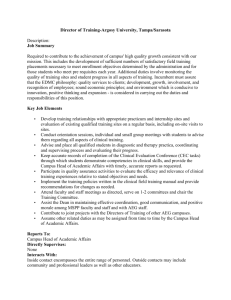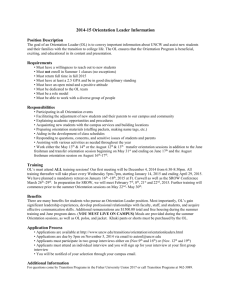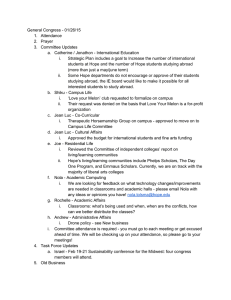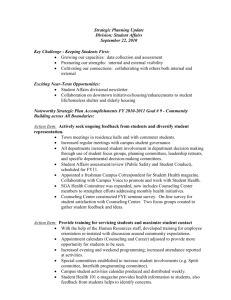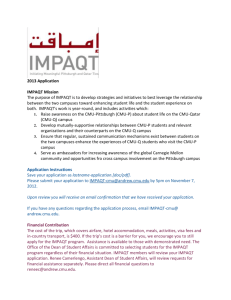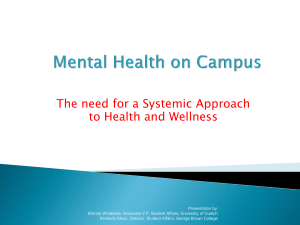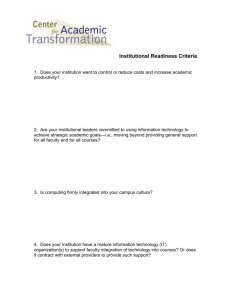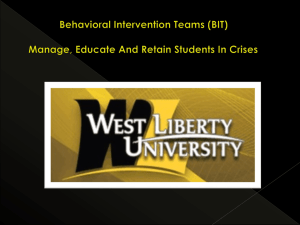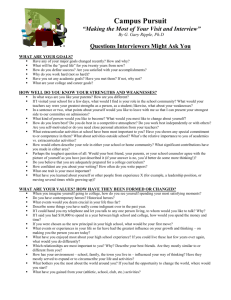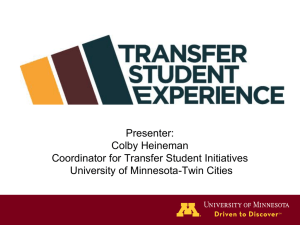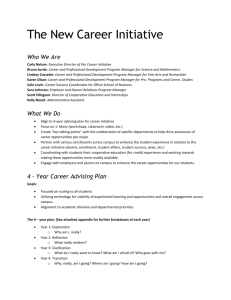DOC - The Career Center - Florida State University
advertisement
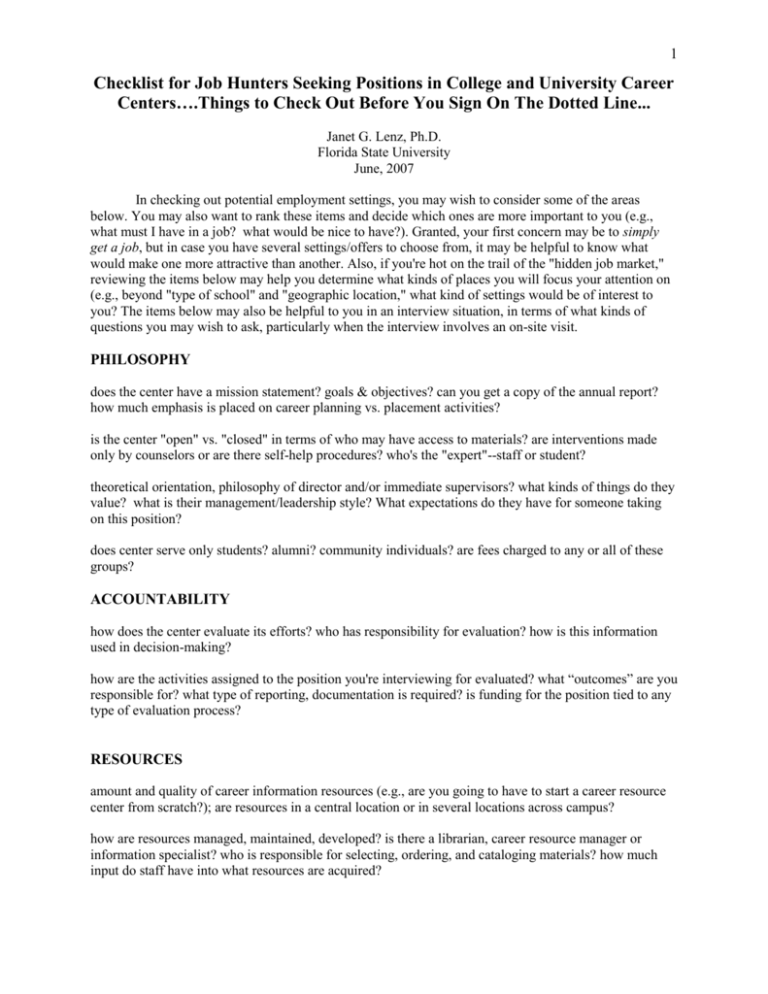
1 Checklist for Job Hunters Seeking Positions in College and University Career Centers….Things to Check Out Before You Sign On The Dotted Line... Janet G. Lenz, Ph.D. Florida State University June, 2007 In checking out potential employment settings, you may wish to consider some of the areas below. You may also want to rank these items and decide which ones are more important to you (e.g., what must I have in a job? what would be nice to have?). Granted, your first concern may be to simply get a job, but in case you have several settings/offers to choose from, it may be helpful to know what would make one more attractive than another. Also, if you're hot on the trail of the "hidden job market," reviewing the items below may help you determine what kinds of places you will focus your attention on (e.g., beyond "type of school" and "geographic location," what kind of settings would be of interest to you? The items below may also be helpful to you in an interview situation, in terms of what kinds of questions you may wish to ask, particularly when the interview involves an on-site visit. PHILOSOPHY does the center have a mission statement? goals & objectives? can you get a copy of the annual report? how much emphasis is placed on career planning vs. placement activities? is the center "open" vs. "closed" in terms of who may have access to materials? are interventions made only by counselors or are there self-help procedures? who's the "expert"--staff or student? theoretical orientation, philosophy of director and/or immediate supervisors? what kinds of things do they value? what is their management/leadership style? What expectations do they have for someone taking on this position? does center serve only students? alumni? community individuals? are fees charged to any or all of these groups? ACCOUNTABILITY how does the center evaluate its efforts? who has responsibility for evaluation? how is this information used in decision-making? how are the activities assigned to the position you're interviewing for evaluated? what “outcomes” are you responsible for? what type of reporting, documentation is required? is funding for the position tied to any type of evaluation process? RESOURCES amount and quality of career information resources (e.g., are you going to have to start a career resource center from scratch?); are resources in a central location or in several locations across campus? how are resources managed, maintained, developed? is there a librarian, career resource manager or information specialist? who is responsible for selecting, ordering, and cataloging materials? how much input do staff have into what resources are acquired? 2 how are resources controlled? is there a checkout procedure? are they kept in the open so users have easy access or is access restricted? what types of assessment instruments are used? who makes decisions about what instruments are used and when and how additional assessments might be acquired? availability of computer-based career guidance systems and support materials for use with the systems? level of commitment and support for systems? availability of computer support for administrative tasks (e.g., record keeping, word processing, database development, etc. web site-appearance of; impression you get of the center from reviewing the site; what types of information are available? What isn't on there? Check to see if staff profiles are available on the Web site. existence of alumni network? community contact network? how managed and maintained? budget--total amount; availability of funds for: purchase of new career materials purchase of staff development materials travel professional association dues purchase of capital equipment--e.g., furniture, desktop and notebook computers, PDAs; what does the office look like where you'd be working? opportunities for professional development (time off with pay to attend workshops, classes, conferences, time to write articles, etc?) availability of interns, peer counselors, work-study staff; are these all paid positions or are some volunteer? are these assigned to different staff members or does one person have primary responsibility for training and supervising? JOB RESPONSIBILITIES how do you get trained and oriented into the specifics of the position and other aspects of the office? is there a more detailed job description than what was included on the position announcement? is it current? who wrote it? delegation of responsibilities (how do professional staff members decide who does what--beyond actual job description, i.e., "other duties as assigned...") what expectations are there for service beyond the center, e.g., serving on student affairs or other university committees, task forces, serving as an advisor to student groups? nature of contacts with employers does the job require travel to make employer contacts? attendance at receptions/information sessions? are staff required to have lunch with employers, greet them upon arrival? 3 teaching responsibilities? nature of course content--career/life planning, "University 101, etc.; is course team taught or will you have sole responsibility?; is the curriculum set or will you have to develop it/revise it? supervisory responsibilities--how many staff will you supervise? do you get a chance to interact with them during the interview process? is the center looking for innovation or a person to carry out previously established responsibilities? do they want a generalist or a specialist or some combination? do other staff members have specialties? how much evening/weekend work is required? is there "comp time" for this or is it considered part of the professional's role? does supervisor encourage involvement in state, regional and/or national associations? other professional development activities? OFFICE POLITICS who is your immediate supervisor? are you accountable to more than one person? is there a feedback/evaluation process for professional staff? when is this done? how often? is the evaluation process tied to salary increases? salary--what is the range? what determines where you are placed in the range? what has the average % salary increase of staff been the past 3-5 years? is there an internal candidate for the position? (if you get the job and they don't, will you have strained office relations from the start?) how are relations between staff in general? if there is "bad blood" between certain staff members, how is this likely to impact you and your work, if at all? if position is new, how or why was it created? what is the nature of the funding for the position, secure line or "soft" money? if position is not a new one, where did previous person go, why did they leave? office "pecking order," chain of command, if any? OFFICE PROCEDURES how much input does staff have on office policies, procedures, issues? how are budgeting process/budget decisions handled? other decisions--e.g., staffing, scheduling, creation of new policies? is there a governance structure in place? is there a policies and procedures manual? how are clients seen--appointment only? drop-ins only? or both what type of system is used for scheduling client appointments (are support staff allowed to schedule or left up to individual counselor?) does the center have evening hours? weekend hours? who covers? 4 office support personnel; how are clerical needs of professional staff handled? do you have access to a support staff person? skill level of clerical personnel--how much can be delegated, particularly if the center is short-staffed?; who delegates to who? CAMPUS/COMMUNITY RELATIONS reputation of center on campus what kinds of linkages are maintained with other offices on campus (e.g., does office do joint workshops w/ counseling center, admissions office, advising center, etc.?) are staff assigned as liaisons to various schools, colleges, departments? How are these assignments made? What expectations are associated with these liaison roles? amount of interaction with other student affairs staff members (joint staff meetings, staff development workshops, etc.)? Who does the career services director directly report to? What is their attitude toward career services-have they been supportive, shown benign neglect or been hostile in some way (e.g., cutting positions, reducing funding)? What division of the institution is career services located in, e.g., students affairs, development, academic affairs; location on the organizational chart may influence office philosophy and mission. campus attitude and support toward career planning and placement services? existence of centralized vs. decentralized career services? are other colleges/departments trying to set up their own career services because they feel the career center is not doing the job? are there other schools in the area? what is relationship of career center with similar service on other campuses (do they jointly sponsor event like career days, share job listings, etc?); what relationships exist, if any, with other community agencies? NEGOTIATING THE POSITION by what date do they plan to make a decision? will you have an opportunity to make a 2nd visit prior to accepting the position? what is negotiable--beginning date, salary, benefits (health insurance, vacation & sick leave, retirement plan, tuition reimbursement), money for travel, office equipment, etc? do they help with or cover moving expenses? what kind of information can they provide to help with the move--newspaper listings, housing information, other general campus and community information materials? JH in Career Services
